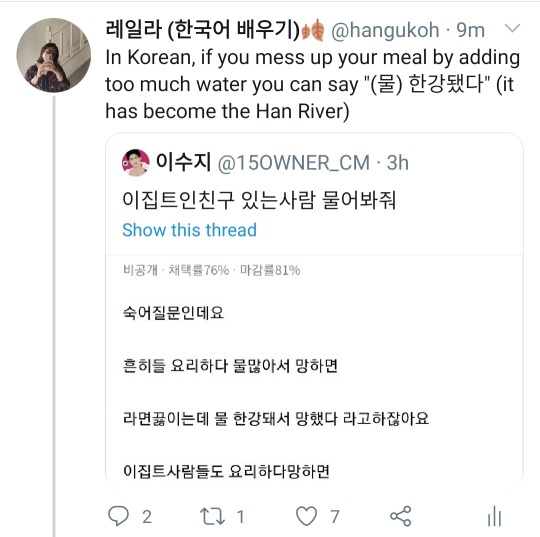Text
A Complete Guide To Becoming Conversational In French

I’m basing this off of this post I wrote a while back, as well as my own experiences. I’ll also copy one of my other posts onto here for the beginner section. Also, check out this post to see what level you are at and where you need to begin.
Beginner (A0 to A1)
I would recommend studying this amazing pronunciation guide by @frenchy-french. Then, I would recommend that you start shadowing and speaking. Try shadowing (i.e. repeat what is being said after the speaker) a beginners podcast like FrenchPod101 (paid) or Coffee Break French (free).
You can try using an app to learn some basic vocabulary. Duolingo and Memrise are my personal favourites. You can also use Drops if you don’t want to translate vocabulary. Try using it daily (it’ll take at most 5 minutes a day).
Complete an online course or textbook. Here is an article with some recommendations for textbooks. Here is a link to a drive full of textbooks, where you will surely find something for French (credit to @salvadorbonaparte for providing this resource). As for online courses, here is a list of some places to find courses: Open Culture, Class central, Effective Language Learning and Loecson.
Make a native friend and start texting them. You can go on r/Language Exchange, or text them on HelloTalk or Tandem. You could also find a buddy on a language discord. Remember to be safe, and not reveal any private information. Look up words as you go, and try texting only in French the whole time. Start doing this as early as possible. Once you have become more confident texting and/or sending voice messages, try a phone call. You can also practice speaking using HiLokal.
Memorise some basic vocabulary and grammar. This post by @frenchy-french is the best for this. For vocabulary, you can use flashcards (like Anki, Quizlet and Memrise). Also, try Kwiziq for grammar.
Immerse. For now, try listening to lots of music, and watch a bunch of fun YouTube videos (like the ones by Cyprien, and Montreaux Comedy). Also, use the language filter on AO3 to look up fanfiction in French. Switch your phone’s language to French, and follow a bunch of French people on social media.
Beginner to intermediate (A1 to B1)
At this level, I would suggest using a textbook or online course. The ones I mentioned earlier might be helpful. Personally, I used GCSE textbooks. I used this Studio 9-1 textbook (good for practicing skills), and this CGP textbook (good for grammar and vocabulary, lots of practice questions). It’s also worth checking out Z-library to see if you can find something for free.
Try working through a grammar book. My personal favourite is the Practice Makes Perfect Complete French Grammar textbook (you can probably find it on Z-library). If you don’t want to use a grammar book though, the second season of Coffee Break French is good too (or you could use it to consolidate your knowledge). Do practice questions if you want, or maybe make a cheat sheet. Don’t forget to use what you learn in your writing and speaking!
Expand your basic vocabulary. You can use a course on Memrise (here is the one I used) or find some vocabulary lists online to learn (the GCSE specification is great to choose topics). You can use flashcards (like Quizlet and Anki), columns or association: whatever works for you. After you have learnt the ones you need for general communication (the GCSE specification might be a good guide for this), I would suggest learning some vocabulary lists about topics that interest you in particular. As well as this, generally try to learn vocabulary you encounter when reading and writing. Remember to use example sentences when learning vocabulary!
Do you remember those speaking buddies you were meant to meet earlier? Well, keep speaking with them. If you’re nervous, try to memorise some set phrases and questions to keep the conversation going. Don’t be afraid to ask someone to slow down, or speak more clearly. Do it as often as you can. You can also continue texting your buddies too. Again, try and stay safe.
Continue to immerse using the methods that I mentioned earlier. You can try watching films and TV shows with English or French subtitles, but I doubt that they will be helpful at this stage. Personally, I read fanfiction, (usually translations of my favourite fics) articles and watched YouTube videos. The articles and YouTube videos were often meant to offer advice about things, since self-help stuff is often quite simple. Just a quick tip.
Watch children’s shows in your target language. Shows like Peppa Pig and the little princess would be good. Just get used to the sounds of the language.
Find a guided reader, or learners exercises (like Lingua), and read them. Also, you could try reading these short stories (recommendations by @frenchy-french).
Shadow Easy French (i.e. repeat what is being said, and imitate the intonation and accent).
Try keeping a journal in French. Every day, just write two or three sentences in the language. For some ideas about what to write, here is a wonderful set of questions by @myhoneststudyblr.
Engage with intermediate French content. I like InnerFrench, RFI: Savoirs, Piece of French and FrenchPod101. Don’t be discouraged if you can’t understand much at first.
Intermediate to conversational (B1 to B2)
Listen to intermediate French podcasts and youtube videos like the ones that I mentioned earlier. Here is an article which lists some good intermediate podcasts. You can also just look up “intermediate french listening practice” and find some good stuff. Try listening without a transcript at first, and then read and listen at the same time.
Continue shadowing native material. Once again, I recommend Easy French for this.
Try watching TV shows and films. Here are some recommendations for TV shows. You can also watch things you’ve seen already dubbed in French, like Disney films. Also, you can use a platform like LingoPie (if you have the funds - I highly recommend it if you do). Make sure that what you choose is not too difficult, and that there is no needless jargon or complex language.
Try to keep a journal in French. Just write about your day, and also your various thoughts and opinions on certain topics. You can also try writing reviews for books and movies, and record vocabulary from there. For some entries, type them up and post them on Journaly for corrections.
Speak with your speaking buddies! Try and learn how to speak around words (i.e. learn how to describe the meaning of the word you are looking for if you can’t remember it).
Work through a grammar book. Keep doing the practice questions, and actively use what you learn in your speaking and writing.
Read articles, fanfiction and books. For articles, I can recommend Le Monde and Liberation. It’s good to keep up with what is going on in France, so give it a shot. For books, I would suggest reading translations of books that you have already read in your native language (this also applies to fanfiction if there is a translation available). Here are some recommendations for native French books. Pick something you like and go for it! As for fanfiction, here is how to filter languages on AO3 and WattPad.
Watch YouTube videos in French. Here are some youtubers you might want to check out.
Watch the news in French. I personally use FranceInter and TV5monde.
Write short stories and essays in French. Perhaps try lifting phrases and vocabulary from books and fanfiction you read? If you write an essay, make it about a topical issue like abortion or the role of family in society (here are some topics for intermediate essay topics). Also, here are some essay phrases.
Needless to say, you will have to continue learning French vocabulary using whichever methods you prefer. Perhaps you can explore @frenchy-french’s vocabulary tag?
And that’s it so far! If you want to go from intermediate to advanced, try to follow this advice in this post by @frenchy-french. Thanks for reading this post! I hope it was useful to you!
3K notes
·
View notes
Text
How to Really Comprehend a Scientific Paper
**credit to my research advisor, she’s an amazing mentor and I aspire to be just like her someday :)
Read the abstract. Write down what the paper says it is going to be about.
Read the introduction. Write down what the paper says it is looking to accomplish and how.
Read the conclusion. Write down what the paper actually did accomplish.
Go through and find all the pictures, graphs, or diagrams. Write notes explaining these images to yourself.
Read the whole paper start to finish. Write a summary of the paper as though you are explaining it to a layperson, and then another summary as though you are explaining it to a colleague.
Throughout all of the above steps:
If there are words you don’t know google them and write down the definitions
If the paper defines a formula, law, variable, etc in a certain way write that down
If there are references to or recommendations of other literature write those down. After the last step if there’s anything you’re uncertain about or would like more information on look to that list for further reading
12K notes
·
View notes
Text
should i go back on my bullshit and pay attention to this blog again...... i want to
#i havent studied languages in months and uni's kicking my ass#dante diz#and even my bio is wrong im not 18 anymore thats how long it's been dhsjdkkdkf
0 notes
Text
Hello!
For those who use memrise for vocabulary or those who want to start using online flashcards to study, I made a small list of nice courses that could be useful for Korean learners.
I really liked the 2000 Essential Korean Words series from Darakwon (the intermediate one personally boosted my skills and confidence a lot). If you want to invest in your studies, the books are great in my opinion.
⁕ Beginner
⁕ Intermediate
I also started making a course from Korean Grammar in Use (the advanced book) because I couldn’t find one for it 😁
I also like courses made from books for TOPIK preparation:
⁕ Beginner
⁕ Intermediate
⁕ Advanced - this one even has synonyms in addition to English translation
If you have a favorite course on memrise, let me know!😊
-Taeri
190 notes
·
View notes
Text
Friendly reminder that it is completely understandable and okay if you didn’t achieve your language learning goals this year. 💕
70 notes
·
View notes
Photo

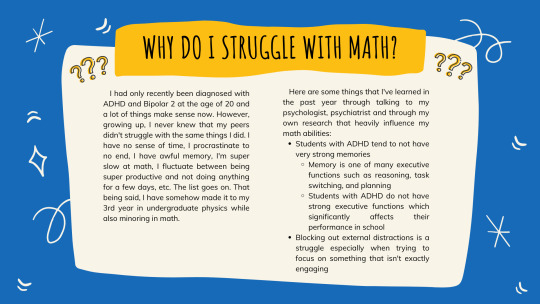
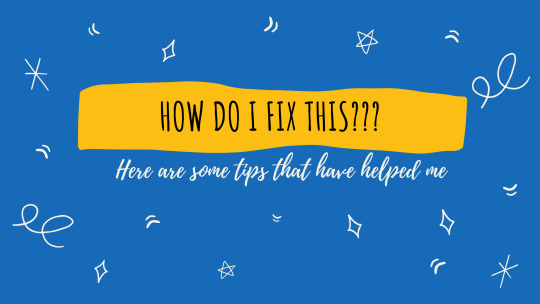
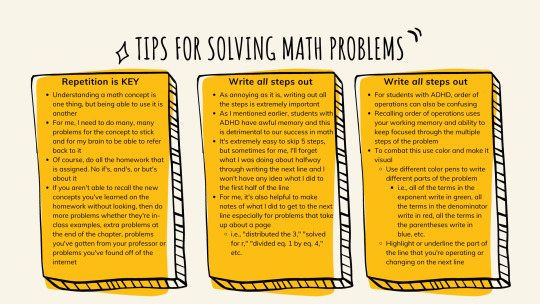
Here’s a short post that I made while procrastinating studying for my quantum mechanics class that is very heavy on the math :)
3K notes
·
View notes
Text
today’s accomplishments🌟24.11.20
cooked a delicious lunch for myself
payed attention in class
studied a little bit of math (i didn’t understand a lot of things, so i have a lot of questions to ask the prof next class)
reviewed french and korean vocabulary
listened to language transfer’s complete greek course (tracks 5+6)
practiced greek reading and writing
made a new acquaintance
went to sleep early (after writing this)
0 notes
Photo

Places
university - Το πανεπιστήμιο campus - η πανεπιστημιούπολη dormitory - η (φοιτητηκή) εστία dining hall - η τραπεζαρία classroom - η τάξη faculty - η σχολή department - το τμήμα
People
professor - ο καθηγητής advisor - ο σύμβουλος supervisor - ο επόπτης instructor - ο εκπαιδευτής lecturer - ο λέκτορας
Types of Lessons
lecture - η διάλεξη workshop - το εργαστήριο seminar - το σεμινάριο conference - το συνέδριο
Student Life
degree - το πτυχίο Master’s το μεταπτυχιακό PhD/doctorate - το διδακτορικό scholarship - η υποτροφία syllabus - η περίληψη thesis/dissertation - η διατριβή paper - η εργασία exam - το διαγώνισμα notes - οι σημειώσεις quiz - το κουιζ laptop - το λάπτοπ ipad - το ipad student club - το φοιτητικό κλάμπ extracurricular - το εξωσχολικό
Verbs
to do well in an exam - γράφω καλά σε ένα διαγώνισμα to do badly in/fail an exam - γράφω άσχημα σε ένα διαγώνισμα to fail an exam - αποτυγχάνω σε ένα διαγώνισμα to take notes - κρατώ/παίρω σημειώσεις to make a presentation/present - κάνω μια παρουσίαση/παρουσιάζω
303 notes
·
View notes
Photo

Daily Routines: Sentences
I wake up. - Ξυπνάω.
I get up. - Σηκώνομαι.
I wash my face. - Πλένω το πρόσωπο μου.
I brush my teeth. - Βουρτσίζω τα δόντια μου.
I take a shower. - Κάνω μπάνιο.
I get dressed. - Ντύνομαι.
I have breakfast. - Τρώω πρωινό.
I go to work/school. - Πηγαίνω στη δουλειά / στο σχολείο.
I start work/school at … - Αρχίζω τη δουλειά / το σχολείο στις …
I have lunch. - Τρώω μεσημεριανό.
I finish work/school at … - Τελειώνω τη δουλειά / το σχολείο στις …
I arrive home at … - Φτάνω στο σπίτι στις …
I have dinner. - Τρώω βραδινό.
I watch T.V./Netflix. - Βλέπω τηλεόραση / Netflix.
I talk to my friends. - Μιλώ στους φίλους μου.
I play video games. - Παίζω βιντεοπαιχνίδια.
I read a book. - Διαβάζω ένα βιβλίο.
I go to bed. - Πηγαίνω για ύπνο.
Daily Routines: Adverbs
Every day/week/month - Κάθε μέρα / εβδομάδα / μήνα
Once a day - Μια φορά την ημέρα
Twice a week - Δύο φορές την εβδομάδα
In the morning/afternoon/evening - Το πρωί / απόγευμα / βράδυ
At night - Τη νύχτα
Early - Νωρίς
Late - Αργά
Daily Routines: Adverbs of Frequency
always - πάντα
often - συχνά
sometimes - μερικές φορές
rarely - σπάνια
never - ποτέ
514 notes
·
View notes
Text
“oh my god, it’s finally over!” i say, about a zoom class that i wasn’t paying attention to at all
105K notes
·
View notes
Text
today's accomplishments 🌟 23.11.20
studied math (today i focused on derivatives)
reviewed korean vocab (from htsk units 1&2)
reviewed french vocab (memrise course)
listened to language transfer's complete greek course (track 4)
showered+ate veggies+drank water
napped when i felt tired :))
i also did my first microbiology test today, it went... alright??? definitely could have gone better
#hi!! gonna start doing these i think#these are inspired by studylustre pls follow her she is a queen#log
0 notes
Text
Korean This vs That Word Differences #5
세탁하다 vs 빨래하다
Both of these have the meaning of ‘to do the laundry’ or ‘to wash clothes’ but there are some small differences. 세탁하다 has a Chinese root (洗濯) whereas 빨래하다 is a native Korean word - this is why you might hear people say 빨래하다 a lot more in colloquial speech. However, specifically, 세탁하다 refers to the washing of clothes using a machine (세탁기 is a washing machine), whereas 빨래하다 can be used when talking about washing clothes with a machine, but also for hand-washing clothes. 빨래하다 is a universal term for washing clothes, but 세탁하다 really only talks about using the washing machine.
짓다 vs 만들다
만들다 is probably one of the earliest verbs that any of us learn when learning Korean - it means ‘to make’. But some of you may have come to a point where you have learned the verb 짓다 which conveys a similar meaning but is slightly more nuanced. 짓다 does indeed mean ‘to make’ but may also mean ‘to build’ - it is used in situations like making/building a house or building, giving something a title or name, or making a facial expression or smile. Comparatively, 만들다 is used more for making objects of a smaller scale.
When talking about ‘building something’, 짓다 is used to talk about referring to something of large scale, like a building or a house, but 만들다 is used to talk about building something like a doll’s house or a pet house (something small).
When talking about ‘making food’, both can be used, however 짓다 is specifically used for cooking/boiling plain rice, but 만들다 is used for making other foods with numerous ingredients.
When talking about ‘making a name’ or ‘giving something a name’, both 짓다 and 만들다 can be used. 짓다 sounds a little more formal, so it is a bit like ‘giving something a title’ or ‘giving a baby a name’, whereas 만들다 is a bit more like ‘giving something a nickname’.
When talking about ‘making a facial expression’ or ‘making a smile’, you can ONLY use 짓다 (표정을 짓다 = to make a face / to pull a face).
When talking about ‘making objects’ like ‘making clothes’, you can ONLY use 만들다 - the scale is not big enough for 짓다 (인형을 만들다 = to make a doll).
핸드폰 vs 휴대폰
Some people may never have even heard the term 휴대폰, I only heard it because my Korean teacher uses it all the time instead of 핸드폰. Of course, both actually mean a cellphone / mobile phone and are completely interchangeable. 핸드폰 is a loan word from English (hand phone), meanwhile 휴대폰 originated from 휴대전화 - 휴대 (携帶) means ‘carry’ and 전화 (電話) means telephone. In recent times, the 전화 has been replaced with 폰 (the English loan word ‘phone’) for ease and is said as 휴대폰. No difference - just preference I guess, and mostly reflects a change in the times / generation thing. Most people call cellphones a 핸드폰 these days because 휴대전화 or 휴대폰 originated from the initial cordless home telephones.
어렵다 vs 힘들다
I have noticed a lot of situations where people use the word 어렵다 when what they really mean to say is 힘들다 (myself included) - this is because in English, we refer to things being ‘difficult’ whether it’s talking about something being difficult to do (as in, not easy), or whether it’s difficult to do because you’re having a hard time. Tricky to conceptualise - here’s some easy examples.
시험이 어려워요 - The exam is difficult
제 일주일은 힘들었어요 - My week was difficult (tough)
한국어를 배우는 것은 어려워요 - Learning Korean is difficult (not easy)
한국어를 배우는 것은 힘들어요 - Learning Korean is tough (mentally difficult - you might not find Korean a particularly difficult language, but you might find it hard to do for whatever external reason)
깜짝 vs 갑자기
You might be surprised but for the longest time I got these two words mixed up completely with each other. You know when people get startled by something and they say ‘깜짝이야’ (깜짝 = surprise, with a start) I actually thought they were saying 갑자기 which means ‘suddenly, abruptly’ - it sounded really similar to me at first - sometimes it’s a bit confusing because their uses can overlap but largely they are used in different circumstances.
460 notes
·
View notes
Text
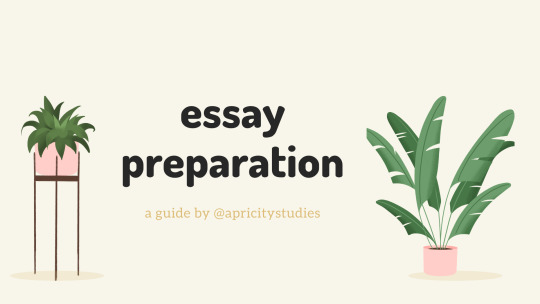
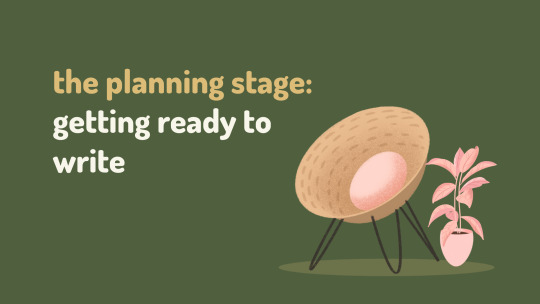
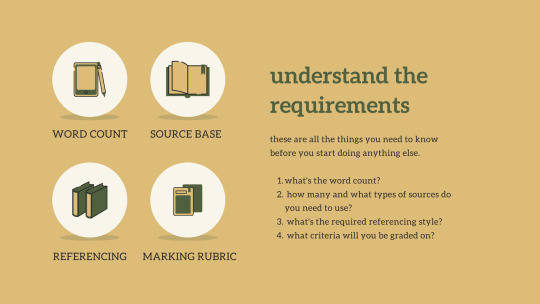
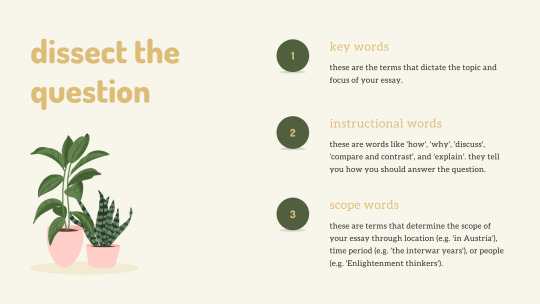
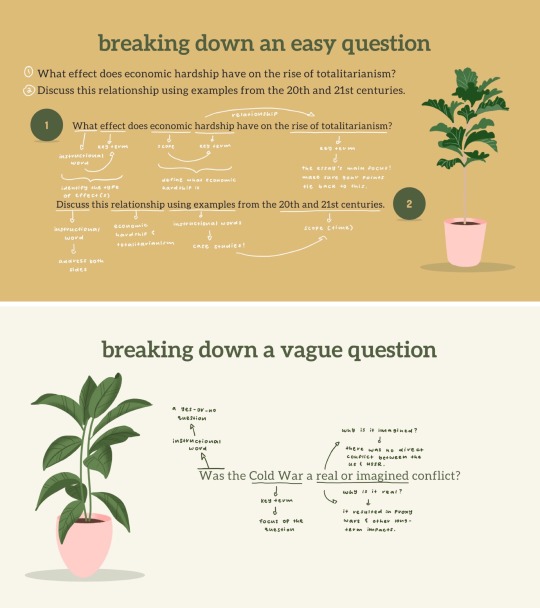

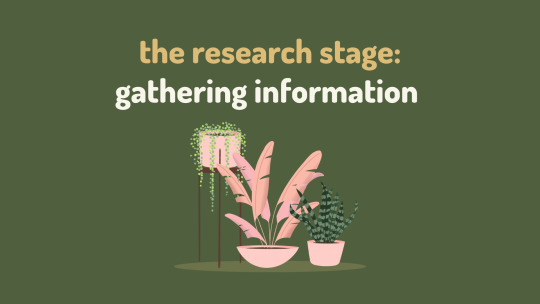
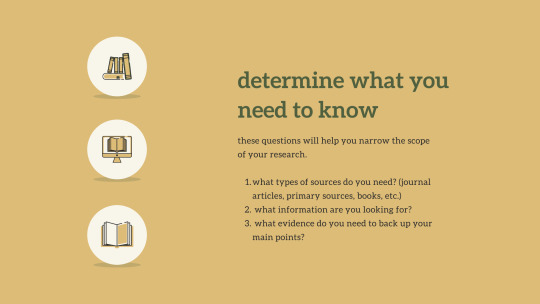
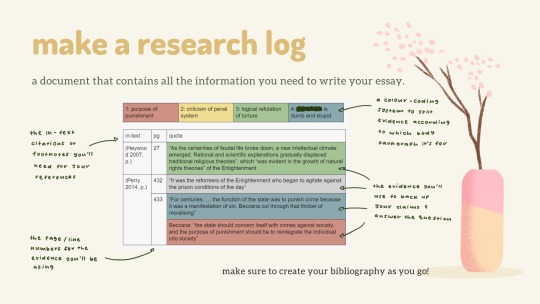
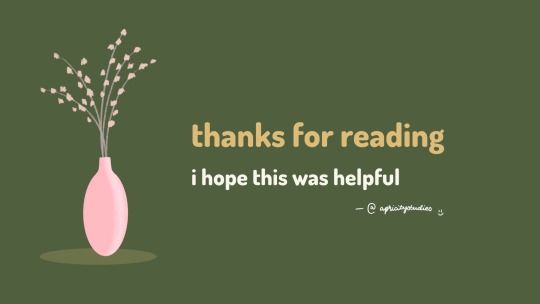
every minute spent on planning saves you ten minutes spent on execution. short essays probably don't require that much preparation beforehand, but if you're writing something longer you should probably spend some time planning first. this is the process i go through when planning my essays, and i find it works really well!
14K notes
·
View notes
Text

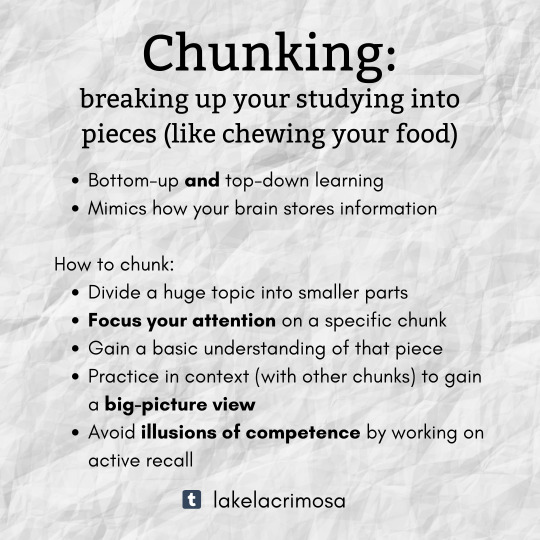


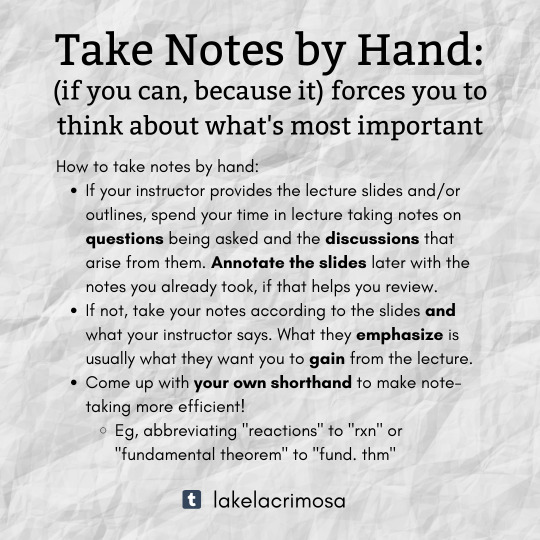

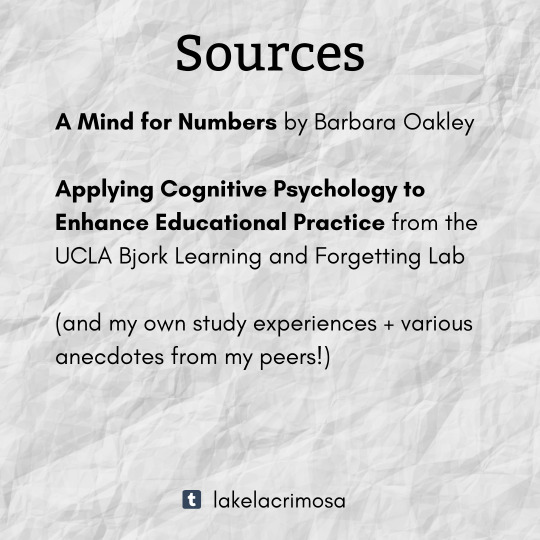
hey everyone! i’m a peer tutor at my university and i wanted to share some study strategies that i’ve found really helpful in my stem/content-heavy courses. please feel free to share yours with me as well!
(image descriptions under the cut)
Keep reading
839 notes
·
View notes
Text
Grammer Post Master List
A master list of grammar posts on my blog. These are in Korean alphabetical order and are mostly intermediate level.
ㄱ
~거나 .. ~거나
~거든
~게
~겠군요
~고
~고 나다
~고말고요
~고 말다
~고 해서
~고는
~ 고도
~고요
~고서
~고자 하다
~곤 하다
~기는요
~기는 하다
~기란
~기로 약속하다 / 결심하다
~기만 하다
ㄴ
~는 김에
~는 대신에
~는 모양이다
~는 물론이다
~는 바람에
~는 사이(에)
~는다고 보다
~는다고 하던데
~는다고 해서
~는다는 것이
~는다니까
~는다면
~는다면서요?
~는답니다
~는데도
ㄷ
~다니
~다니(요)?
~단 말이에요.
~더라
N + 더러
~던데
~도록 하다
~도 (말고) .. ~도 말고
~듯이
ㅁ
N + 만 못하다
N + 만하다
ㅇ
~어/아 놓다
~어/아/여 버리다
~어/아/여다가
~어/아야
~어/아야 겠다
~어/아/여야지요
~어/아/여지
어찌나 ~은/는지
~었/았더니
~었/았던 것 같다
~었/았/였을 텐데
~에 따르면
~에 비해서
~(으)려던 참이다
~(으)면 되다
~(으)면서도
N을/를 대상으로
~(으)ㄹ 만하다
~(으)ㄹ 뻔하다
~(으)ㄹ 뿐만 아니라
~(으)ㄹ 뿐이다
~(으)ㄹ 텐데(요)
~(으)ㄹ걸요
~(으)ㄹ까 하다
~(으)ㄹ지도 모르다
N+(이)라도
N+(이)라든가
N+(이)야말로
ㅈ
자고?
~지
~지 그래요?
~지요
ㅊ
~처럼
Etc.
~제일/일등/첫째 가다
[Time Noun] 이/가 되다
2K notes
·
View notes
